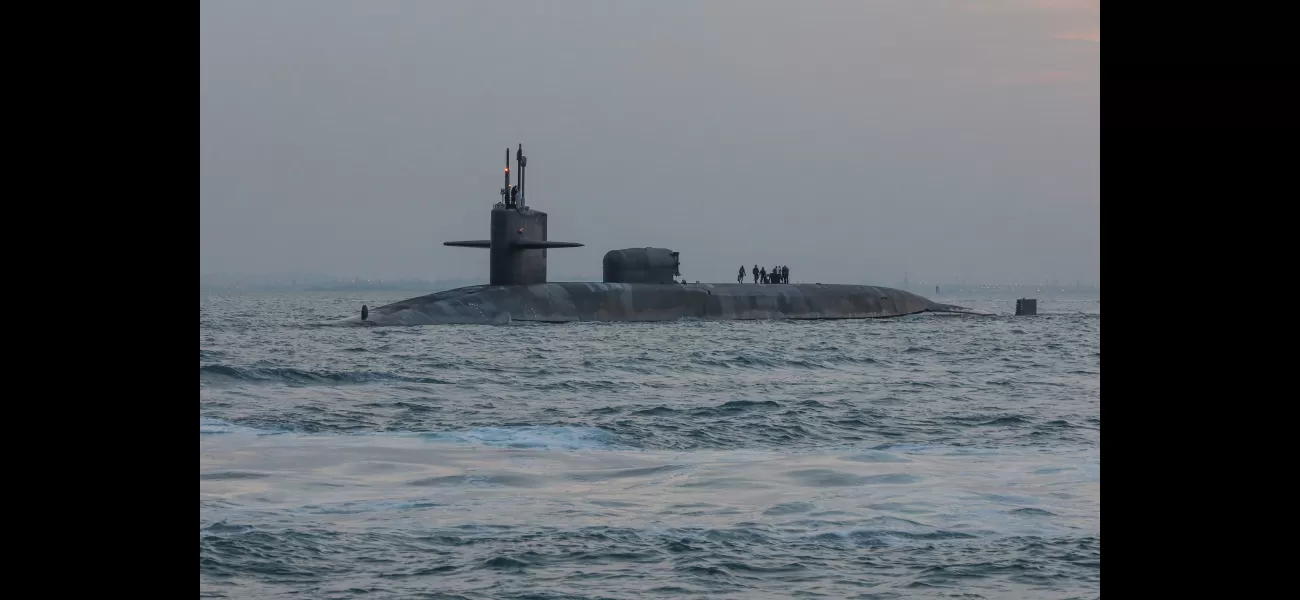Israel and the United States are preparing for a possible attack from Iran, fearing retaliation for a recent airstrike that killed an Iranian general.
Iran may strike Israel and jeopardize Gaza's ceasefire negotiations.
August 12th 2024.

As tensions continue to rise between Israel and Iran, both countries are preparing for a potential attack on Israel. This comes as efforts to secure a ceasefire in Gaza have intensified, with formal negotiations set to resume this week.
Mediators have been urging both Israel and Hamas to return to the negotiating table, as the talks were at risk of being derailed by recent assassinations of leaders from Hezbollah and Hamas. These assassinations have been linked to Iran, who has vowed to avenge the deaths. Negotiations are scheduled to take place in either Cairo or Doha on Thursday, with the US, Egypt, and Qatar acting as key mediators. Last week, they announced that they would present a final proposal and urged both sides to attend.
However, the possibility of a major Iranian attack against Israel could disrupt the ceasefire talks, which were reportedly at an advanced stage before the recent events. The US has expressed its concern and has increased its military presence in the region in preparation for a potential Iranian reprisal. The White House stated that it shares Israel's concerns and expectations, while the State Department believes that the talks will continue to move forward.
Although Israel has confirmed its attendance at the upcoming talks, Hamas has not yet confirmed if they will be participating. Despite this, they have indicated that they still want to reach a deal. The onus is now on Hamas to agree to a ceasefire, with the State Department stating that they are the biggest obstacle to achieving a deal.
The recent assassination of Hamas' political leader, Ismail Haniyeh, has further fueled tensions between Iran and Israel. Iran's Supreme Leader Ayatollah Ali Khamenei and the Islamic Revolutionary Guard Corps have both vowed to avenge his death. Iranian President Masoud Pezeshkian has also made threats, stating that Iran has the right to self-defense and to respond to any aggression.
There have been indications that Iran may abandon plans to attack Israel if a ceasefire deal is reached, but their mission to the United Nations has stated that their retaliation for Haniyeh's death is unrelated to the Gaza ceasefire. As preparations for a potential attack continue, the US has released $3.5 billion in funds to Israel for military equipment and has ordered a guided missile submarine and carrier strike group to the region.
Despite these tensions, there is still hope for a potential ceasefire. Both Israel and Iran have expressed their desire to not let any potential attacks affect the negotiations. However, the situation remains unpredictable and both sides are making preparations for all possible scenarios. The international community, including France, Germany, and the UK, have also endorsed the calls for a ceasefire, stating that there can be no further delay given the threat of a regional conflict.
As tensions between Israel and Iran continue to rise, both countries are taking necessary precautions to prepare for a potential attack from Iran. This comes as mediators work tirelessly to secure a ceasefire in Gaza and resume negotiations between Israel and Hamas.
The recent assassinations of leaders from both Hezbollah and Hamas have threatened to derail the talks, with Iran and its Lebanese proxy vowing to retaliate. However, the mediators are urging both sides to return to the negotiating table in the hopes of reaching a deal. The talks are set to resume in Cairo or Doha later this week, and the US, Egypt, and Qatar have stated that they will present a final proposal.
The possibility of a major Iranian attack against Israel looms over the ceasefire talks, causing concern for US officials who have been working towards a resolution. The recent assassination of Hamas' political leader, Ismail Haniyeh, in Tehran has only added to the tension, with Iran blaming Israel for his death. However, Israel has neither confirmed nor denied any involvement.
In a joint statement, France, Germany, and the UK have endorsed the calls for a ceasefire, emphasizing the urgent need to reach a resolution before the situation escalates further. The White House has also expressed its support for Israel and its concerns about a potential attack from Iran, increasing their military presence in the region as a precaution.
Despite the looming threat, the State Department remains confident that the talks will continue to move forward. They have placed the responsibility on Hamas to agree to a ceasefire. While Israel has confirmed their attendance at the upcoming negotiations, Hamas has yet to confirm but has indicated their desire for a deal.
Following Haniyeh's assassination, Iran's Supreme Leader and Revolutionary Guard have both made threats of retaliation, stating that his death will not go unpunished. The Iranian President also expressed their right to self-defense and to respond to any aggression. However, there have been some indications that Iran may reconsider their plans if a ceasefire deal is reached.
In preparation for a potential attack, the US has ordered a guided missile submarine and accelerated the arrival of a carrier strike group to the Middle East. They have also released $3.5 billion in military aid to Israel. In response, the Israeli military has suspended vacation flights for their personnel.
Despite the tension and threats, Iran's UN mission has stated that they hope any potential attack on Israel will not hinder the ceasefire talks. With both sides preparing for the worst, the hope is that a resolution can be reached before any further escalation occurs.
Mediators have been urging both Israel and Hamas to return to the negotiating table, as the talks were at risk of being derailed by recent assassinations of leaders from Hezbollah and Hamas. These assassinations have been linked to Iran, who has vowed to avenge the deaths. Negotiations are scheduled to take place in either Cairo or Doha on Thursday, with the US, Egypt, and Qatar acting as key mediators. Last week, they announced that they would present a final proposal and urged both sides to attend.
However, the possibility of a major Iranian attack against Israel could disrupt the ceasefire talks, which were reportedly at an advanced stage before the recent events. The US has expressed its concern and has increased its military presence in the region in preparation for a potential Iranian reprisal. The White House stated that it shares Israel's concerns and expectations, while the State Department believes that the talks will continue to move forward.
Although Israel has confirmed its attendance at the upcoming talks, Hamas has not yet confirmed if they will be participating. Despite this, they have indicated that they still want to reach a deal. The onus is now on Hamas to agree to a ceasefire, with the State Department stating that they are the biggest obstacle to achieving a deal.
The recent assassination of Hamas' political leader, Ismail Haniyeh, has further fueled tensions between Iran and Israel. Iran's Supreme Leader Ayatollah Ali Khamenei and the Islamic Revolutionary Guard Corps have both vowed to avenge his death. Iranian President Masoud Pezeshkian has also made threats, stating that Iran has the right to self-defense and to respond to any aggression.
There have been indications that Iran may abandon plans to attack Israel if a ceasefire deal is reached, but their mission to the United Nations has stated that their retaliation for Haniyeh's death is unrelated to the Gaza ceasefire. As preparations for a potential attack continue, the US has released $3.5 billion in funds to Israel for military equipment and has ordered a guided missile submarine and carrier strike group to the region.
Despite these tensions, there is still hope for a potential ceasefire. Both Israel and Iran have expressed their desire to not let any potential attacks affect the negotiations. However, the situation remains unpredictable and both sides are making preparations for all possible scenarios. The international community, including France, Germany, and the UK, have also endorsed the calls for a ceasefire, stating that there can be no further delay given the threat of a regional conflict.
As tensions between Israel and Iran continue to rise, both countries are taking necessary precautions to prepare for a potential attack from Iran. This comes as mediators work tirelessly to secure a ceasefire in Gaza and resume negotiations between Israel and Hamas.
The recent assassinations of leaders from both Hezbollah and Hamas have threatened to derail the talks, with Iran and its Lebanese proxy vowing to retaliate. However, the mediators are urging both sides to return to the negotiating table in the hopes of reaching a deal. The talks are set to resume in Cairo or Doha later this week, and the US, Egypt, and Qatar have stated that they will present a final proposal.
The possibility of a major Iranian attack against Israel looms over the ceasefire talks, causing concern for US officials who have been working towards a resolution. The recent assassination of Hamas' political leader, Ismail Haniyeh, in Tehran has only added to the tension, with Iran blaming Israel for his death. However, Israel has neither confirmed nor denied any involvement.
In a joint statement, France, Germany, and the UK have endorsed the calls for a ceasefire, emphasizing the urgent need to reach a resolution before the situation escalates further. The White House has also expressed its support for Israel and its concerns about a potential attack from Iran, increasing their military presence in the region as a precaution.
Despite the looming threat, the State Department remains confident that the talks will continue to move forward. They have placed the responsibility on Hamas to agree to a ceasefire. While Israel has confirmed their attendance at the upcoming negotiations, Hamas has yet to confirm but has indicated their desire for a deal.
Following Haniyeh's assassination, Iran's Supreme Leader and Revolutionary Guard have both made threats of retaliation, stating that his death will not go unpunished. The Iranian President also expressed their right to self-defense and to respond to any aggression. However, there have been some indications that Iran may reconsider their plans if a ceasefire deal is reached.
In preparation for a potential attack, the US has ordered a guided missile submarine and accelerated the arrival of a carrier strike group to the Middle East. They have also released $3.5 billion in military aid to Israel. In response, the Israeli military has suspended vacation flights for their personnel.
Despite the tension and threats, Iran's UN mission has stated that they hope any potential attack on Israel will not hinder the ceasefire talks. With both sides preparing for the worst, the hope is that a resolution can be reached before any further escalation occurs.
[This article has been trending online recently and has been generated with AI. Your feed is customized.]
[Generative AI is experimental.]
0
0
Submit Comment





